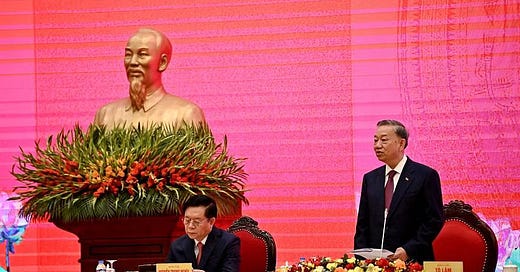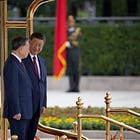Vietnam’s Top Cop Clears Away Rivals on the Way Up
Now at the top, To Lam’s dirty dossiers can keep him there
By: David Brown
For months, it was evident that Vietnam’s paramount leader Nguyen Phu Trong was more than usually unwell. Trong had survived a stroke in 2019 but then went on to serve an unprecedented third term as leader of Vietnam’s Communist Party (VCP). His health seems to have taken a turn for the worse last winter. He had been moved into a suite at Hanoi’s Military Hospital 108 and was seen only rarely on state occasions. Meanwhile, seemingly paralyzed by uncertainty, senior government and party officials went cautiously about their duties.
There was one exception, most obvious in retrospect: Minister of Public Security To Lam was intent on clearing away all possible rivals to following Trong as General Secretary, the head of the party. In recent months, Vietnamese observers have often referenced Minister Lam’s command of dossiers full of compromising details on the behavior of senior government and Party officials. He is said to have deployed detailed enough evidence of malfeasance to turn Trong successively against two deputy prime ministers, State President Nguyen Xuan Phuc, and then, this year, against Phuc’s successor, Vo Van Thuong and the Chairman of the National Assembly, Vuong Dinh Hue.
The ailing general secretary is said to have hoped that either of the two last-named, Truong and Hue, would be his successor as head of the VCP. Following a now familiar script, however, both chose to resign office rather than face charges of malfeasance. Thus, when on July 19, Trong passed away, Minister To Lam was uniquely positioned to claim the Party leadership. His ambition was fueled by possession of “dirty dossiers” on the 200 members of the VCP’s Central Committee and ratified by their votes at an extraordinary meeting on August 3. Lam’s position as the party’s new general secretary was then solidified by the Central Committee’s vote to pack the politburo and secretariat with several of Lam’s former subordinates at the Ministry of Public Security.
It appears – and here we are parsing crumbs – the new political order, preoccupied with what it calls “the fight against corruption and negativity, … relentless, without exception, no matter who the person is” will be only secondarily intent on growing Vietnam’s economy.
Vietnam’s labor force is still relatively young and high-tech businesses in the US and other advanced nations are eager to outsource major opportunities for growth. From the perspective of an analyst who thinks the best medicine for endemic corruption is paying government employees a decent salary and rewarding corporate initiative, it looks as though the gains Vietnam’s economy may register in the crucial years ahead will be made not because of the never-ending anti-corruption campaign but in spite of it.
Take for example the evolution of Vietnam’s energy sector, which I watch with considerable interest. Just a few years ago, it was quite reasonable to believe that with investment support from Western nations, Vietnam could make a tidy transition from dependence on coal to exploitation of its abundant endowment of solar and wind power. So far, however, there’s scant reason for such optimism.
The Vietnamese struggled to agree on Power Development Plan #8. Energy Department veterans and their allies at the national coal, gas, and oil monopolies dragged their feet. Reformers within the government enlisted the help of outside advisers, notably domestic advocates of ‘green’ power sources and, by extension, their foreign associates. As 2022 ended, it all seemed to be coming together. Prime Minister Pham Minh Chinh told a global audience at COP 26 that Vietnam would have net zero carbon emissions by 2050. A group of Western nations organized as the Just Energy Transition Partnership promised to mobilize US$15.5 billion, mostly in soft loans, to support clean energy projects in Vietnam.
In 2023, things came apart. PDP-8 was approved but fossil fuel advocates still ran the Energy Department. Vietnam’s police found pretexts to jail the leaders of Green ID and other renewable energy advocacy groups, experts who had successfully lobbied the prime minister and key associates. Vietnam may eventually get traction in its planned transition to low-carbon power sources, but by its present form, it will be an evolution managed by party members who have scant experience deploying new energy technologies.
In conclusion, we might note that Nguyen Tan Dung, originally a policeman and party activist and later prime Minister from 2006 to 2016, was prominent at an old boys gathering hosted by To Lam just a few days after Lam was confirmed as the new party leader. As PM, Dung’s instincts were entrepreneurial; as analyst David Hutt recently explained, Dung believed “that the party can most effectively limit the power of the private sector by joining hands with it… Businessmen and tycoons will need to go to the party to access land, get contracts, and win favorable decisions from the courts.”
That’s still a fairly accurate description of how things get done in Vietnam; the only difference being that post-2016, once Nguyen Phu Trong had bested Dung in a brutal contest for leadership of the party, when cozy accommodations between the private sector and officials were uncovered, these were grounds for punishment, dismissal and sometimes prison terms for the officials.
Unlike General Secretary Trong and much like Dung, To Lam gives no sign of planning to use ideology to motivate party cadres and judge their fitness for promotion. To is a “securocrat” and a pragmatist with easy access to dossiers on every one of the party’s rising stars. By present form, his reelection as party boss will be a sure thing well before January 2026, when some 2,000 delegates will convene at the CPV’s 14th Congress to acclaim his leadership.
David Brown is a former US diplomat with wide experience in Southeast Asia, particularly Vietnam, and in energy policy coordination. He is a regular contributor to Asia Sentinel




